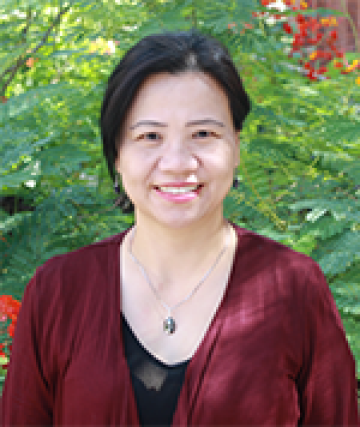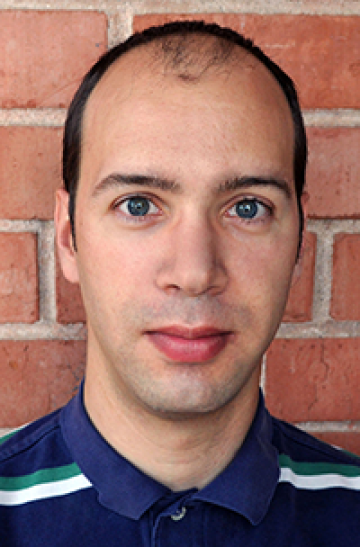National Academy of Inventors honors 4 faculty members

Minying Cai

Luca Caucci

Eugene Gerner

Thomas Milster
The National Academy of Inventors has named four University of Arizona inventors to the its 2020 class of senior members: Minying Cai, research professor of chemistry and biochemistry and BIO5 Institute member, Luca Caucci, assistant research professor of medical imaging, Eugene Gerner, professor emeritus of cell biology and anatomy, and Thomas Milster, professor of optical sciences.
NAI senior members are active faculty, scientists and administrators with success in patents, licensing and commercialization who have produced technologies that have brought, or aspire to bring, real impact on the welfare of society, according to the academy Senior members also foster a spirit of innovation within their communities through enhancing an inventive atmosphere at their institutions, while educating and mentoring the next generation of inventors.
"Working with inventors like these to protect their discoveries and work to get them out into the public is one of the best parts of our job," said Doug Hockstad, assistant vice president of Tech Launch Arizona, the University's commercialization arm. The University of Arizona "is fortunate to have inventors like these four, creating innovations that will change the world and then working with TLA to move them into the public sphere."
Senior members are named twice a year, in February and August. A total of 38 investors were named senior members in the latest round, representing 24 research universities and government and nonprofit research institutes.
Minying Cai
Cai has been with the Department of Chemistry and Biochemistry for more than 20 years and has more than 100 publications and numerous patents in the area of novel drug discovery for obesity, diabetes, cancer, pain and neuro-disorder diseases. Cai received her doctorate from the University in biochemistry and molecular biophysics.
Her research focuses on identifying and developing molecular modulators of melanocortin receptors for the therapeutic treatment of numerous medical disorders associated with the skin, including melanoma and metabolic and central nervous system disorders.
Cai has developed new compounds and approaches to overcome melanoma tumor resistance to chemotherapy.
She has been an inventor on 21 invention disclosures and 35 filed patents. The seven issued U.S. patents bearing her name have all been exclusively licensed. Her inventions have gone on to be the foundations of three startups.
"It is my greatest honor to receive this award," Cai said. She expressed gratitude to "all the collaborators, including students from around the world, who I have been working with in the previous 21 years. This will inspire me to continue developing new technologies and drugs to combat the many challenges in health."
Luca Caucci
Caucci received his doctorate in optical sciences from the University of Arizona in 2012. He has been an assistant research professor in the Department of Medical Imaging since 2014.
His current research interests are in medical imaging and computing. Applications include task-based assessment of image quality, optimal methods for signal detection and parameter estimation, adaptive systems, photon-processing detectors, and fast computational methods on parallel architectures for photon-processing data processing for
positron emission tomography and single photon emission computed tomography imaging.
Caucci is the principal investigator of a National Institutes of Health grant for a project titled "Emission Computed Tomography and Parallel Computing." He has been granted six U.S. patents – one of them is currently licensed.
"Becoming a senior member of the National Academy of Inventors represents a huge achievement for me, both academically and personally," Caucci said. "This would not have been possible without the help I received from my co-inventors and the support from the University of Arizona."
Eugene Gerner
Gerner is co-founder and chief science officer of University of Arizona startup Cancer Prevention Pharmaceuticals Inc., which is based on his research and discoveries. CPP is a clinical stage company established in 2008 to develop therapies to prevent cancer in people with elevated risk for the disease. In 2013, the company received funding from the National Cancer Institute for a colon cancer clinical trial, during which researchers provided more than 1,300 colon cancer survivors with daily treatment for three years to prevent the occurrence of colorectal cancer or high-risk polyps, and compared the effects with a placebo group.
Gerner has been involved in 14 invention disclosures to TLA. Ten U.S. patents list him as an inventor and several others are pending.
"I was honored to be nominated for this election by colleagues at the University of Arizona," Gerner said. "It is personally gratifying to be recognized by peers for my contributions. It is especially rewarding to see the results of my research be translated into practical solutions to address societal problems."
Thomas Milster
Milster is a professor in the James C. Wyant College of Optical Sciences. During his career, he has also been an optical engineer with Lawrence Livermore National Laboratory and a staff engineer for IBM.
His research has focused on hypernumerical aperture imaging and near field optics, optical data storage, statistical imaging and the OPTISCAN simulation project, a tool for simulating the operation of optical systems.
Most recently, Milster and two co-inventors developed a new Raman spectrometer that can analyze the chemical makeup of samples and requires minimal training to operate. The technology was licensed to startup Botanisol Analytics in 2017. The company, in collaboration with other partners, recently won a $1.5 million contract to build the systems for the Air Force Research Laboratory. With additional discretionary funding, Botanisol Analytics anticipates being able to field COVID-19 screeners in the fall of 2020.
Milster has been an inventor on 47 disclosures and 40 filed patents. He has 10 U.S. patents to his name, with six of those being exclusively licensed.
"I am honored to be elected as a senior member into the National Academy of Inventors," he said. "It is humbling to be included with such outstanding academic inventors."
About NA Senior Members
"NAI member institutions support some of the most elite innovators on the horizon. With the NAI senior member award distinction, we are recognizing innovators who are rising stars in their fields and the innovative ecosystems that support their work," said Paul R. Sanberg, NAI president. "This new class is joining a prolific group of academic visionaries already defining tomorrow."
Following nomination, candidates for senior membership undergo a rigorous selection process by the NAI advisory committee, which is composed of elected NAI members and other professionals considered pioneers in their respective fields.
The University of Arizona now has a total of nine senior members and nine fellows. Lists of NAI fellows and senior members are available on the NAI website.
A version of this article originally appeared on the Tech Launch Arizona website.

